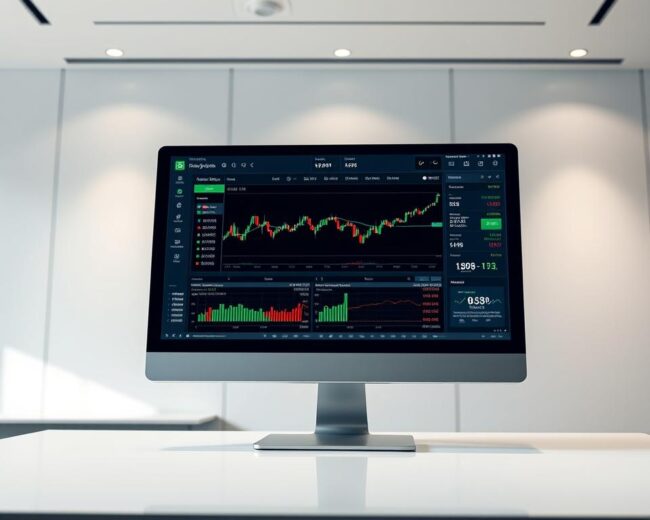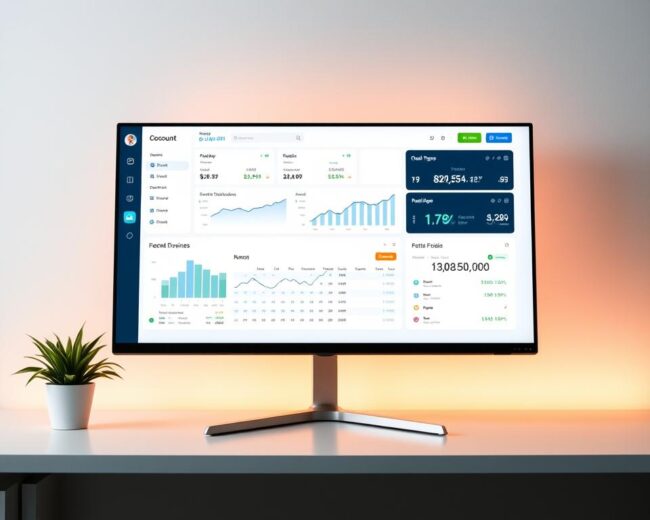Did you know you can open a brokerage account in just 15 minutes with a mobile device? This is great for those new to investing in the stock market. A brokerage account lets you buy and sell investments like stocks or mutual funds. It’s key for growing your investment portfolio and reaching your financial goals. We’ll show you how to open a brokerage account step by step, including the benefits and how to invest.
Key Takeaways
- Opening a brokerage account can be completed in approximately 15 minutes using a mobile device.
- Most online brokers do not require account minimums, allowing users to open accounts with little to no initial investment in their brokerage account.
- Brokerage accounts allow for penalty-free withdrawals, making them suitable for those who may need access to funds before retirement age from their investment account.
- Investments in the stock market should generally not be relied upon for at least five years due to price volatility.
- Robo-advisors, such as Betterment and Wealthfront, often have low account minimums and fees significantly lower than traditional financial advisors for a brokerage account.
- It is recommended to maximize retirement contributions before investing in a brokerage account due to the tax implications associated with capital gains, interest, and dividends in an investment account.
Understanding Brokerage Accounts and Their Purpose
A brokerage account lets you buy and sell investments like stocks and bonds. You can do this through an online broker or a stock trading platform. It’s a flexible way to manage your money, and you can access it anytime. People use these accounts for retirement savings or short-term goals like buying a house or paying for a wedding.
There are many types of brokerage accounts, each with its own perks. For instance, individual accounts are for one person, while joint accounts are for two or more. Retirement accounts, like IRAs and 401(k)s, offer tax benefits for long-term investing. When picking a brokerage account, think about your goals, how much risk you can take, and your financial situation.

Brokerage accounts offer flexibility, convenience, and the chance for long-term growth. With an online broker, managing your investments is easy. You can track your portfolio and make trades online. Many firms also offer help with investing, like self-management, advisor support, and automated options. Knowing about different accounts helps you make smart choices for your investments.
Choosing the Right Broker for Your Needs
When picking a broker, think about fees, investment choices, and customer service. A good broker has low fees, many investment options, and great service. For example, Charles Schwab has no fees for stocks, ETFs, and options, which is great for investors.
Some brokers, though, might charge a lot, like up to $100 for transfer fees. It’s also key to look at the investment options. Vanguard is known for its low-cost funds, perfect for long-term investing. E*TRADE, on the other hand, has many platforms for all kinds of investors.
Also, check the broker’s reputation and experience. Look at their asset management services and portfolio management too. This will help you choose the best broker for you.
Fidelity is often seen as the top brokerage choice. Robinhood also offers free trading for US-listed stocks. But, Robinhood doesn’t support index funds, mutual funds, or bonds, which might limit some investors. The right broker depends on your needs and goals, so research and compare before deciding.

- Fees and commissions
- Range of investment options
- Customer service and support
- Reputation and experience in the industry
- Asset management services and portfolio management capabilities
By looking at these factors and doing your homework, you can find a broker that fits your needs and helps you reach your investment goals.
Essential Documents and Information Needed to Open a Brokerage Account
To open a brokerage account, you need to provide some documents and information. You’ll need personal ID like a driver’s license or passport. Also, you’ll need to share your financial details, like income and net worth. Lastly, you’ll need your banking info, such as account numbers and routing numbers. A financial advisor can help you get everything ready for securities trading.
When you’re ready to open a brokerage account, make sure you have these things ready:
- Personal identification documents
- Financial information, including income and net worth statements
- Banking details, such as account numbers and routing numbers
A financial advisor can guide you through opening a brokerage account. They can also help with securities trading. With the right documents and info, you can start investing and reach your financial goals.

Having all the necessary documents and info makes opening a brokerage account easy. It lets you start securities trading and work with a financial advisor to meet your investment goals.
| Document | Description |
|---|---|
| Driver’s License | Personal identification document |
| Passport | Personal identification document |
| Income Statement | Financial information document |
Comparing Traditional vs Online Brokers
When managing your investments, you face two main choices: traditional brokers and online brokers. Traditional brokers offer advice and portfolio management, which is great for those needing help with wealth management. But, these services usually cost more.
On the other hand, online brokers are more affordable and easy to use. They let you do online trading and access many investment options from home. This is perfect for those who like to invest on their own and want to save money.
Some key benefits of online brokers include:
- Lower fees: Online brokers charge less than traditional brokers, making them more affordable for many.
- Greater flexibility: Online brokers let you trade and check your account anytime, giving you more control.
- Wide range of investment options: They offer many choices, like stocks, bonds, mutual funds, and ETFs.

Choosing between a traditional broker and an online broker depends on your needs and preferences. If you prefer personalized service and guidance, traditional brokers might be worth the extra cost. But, if you’re okay with managing your investments yourself and want to save, an online broker could be the better choice.
How to Open a Brokerage Account: The Complete Process
Opening a brokerage account is easy and can be done online or by phone. Many brokers let you start with $1,000 or less. Some don’t even need an initial deposit. You’ll need to provide some documents and info first, then fund your account to start investing.
The whole process usually takes a few days to a week. Once your account is funded, you can start investing right away. Some brokers might ask for $5,000 or more, but they offer more services. It’s key to compare different brokers to find the best fit for you.
When opening an investment account, consider the initial investment, trading fees, and account costs. Many brokers now don’t charge for stock trades, and some have low or no account fees. Knowing the types of accounts, like cash and margin accounts, and their pros and cons is also important.

After opening your brokerage account, you can invest in stocks, bonds, and mutual funds. It’s vital to know your investment goals and how much risk you can take. With the right broker and strategy, you can reach your financial goals and secure your future.
Understanding Trading Fees and Account Minimums
When you use an online broker, knowing about trading fees and account minimums is key. These fees can include commissions and management fees. They can change based on the broker and your account type.
For instance, some brokers don’t charge for online stock and ETF trades. Others might charge a fee per share.
Account minimums are the amount you must keep in your account to avoid fees. Many brokers let you start with no money upfront. Some have no minimums to open an account. But, some accounts might need a certain balance to avoid fees.
It’s also good to know about hidden costs. These can include inactivity fees or fees for research and data. These costs can reduce your investment returns over time. Knowing about these fees helps you avoid surprises.
Some common fees to watch out for include:
- Trade commissions for stock and ETF trades
- Mutual fund transaction fees
- Management fees for financial advisors or robo-advisors
- Inactivity fees or maintenance fees
Choosing a broker with low or no fees helps you keep more of your investment. This way, you can reach your financial goals faster. Always compare different platforms to find the best one for your budget.
Security Measures and Account Protection
Brokers have many ways to protect your investments. They use encryption, firewalls, and secure login to keep your account safe. They also offer asset management services and portfolio management tools to help you manage your investments.
Brokers use multi-factor authentication to add an extra layer of security. This means you need two things to log in, like a password and a fingerprint. They also send instant alerts for any changes in your account, so you can act fast.
To keep your account safe, use a strong password and don’t share your info. Always check your statements for any strange activity. If you find something wrong, tell your broker right away. Working with your broker and using their asset management services can help protect your investments.
- Two-factor authentication
- Encryption for sensitive data
- Secure login procedures
- Regular account monitoring and alerts
- Coverage for losses due to unauthorized activity
Choosing a broker with strong security and protecting your account can give you peace of mind. You can then focus on growing your investments with confidence.
Managing and Monitoring Your Investment Account
After setting up your brokerage account and starting to invest, it’s time to manage and watch your portfolio. Use the tools your broker offers to track your investments closely. Set up alerts to know about any big changes or problems with your investments.
Keeping your account in good shape is important. It helps your investment plan stay on track with your financial goals and how much risk you’re okay with. Look over your account statements and transaction history often. This way, you can make smart changes when needed. By managing and watching your investments, you’ll be ready for the changes in online trading. This helps you reach your financial goals over time.
